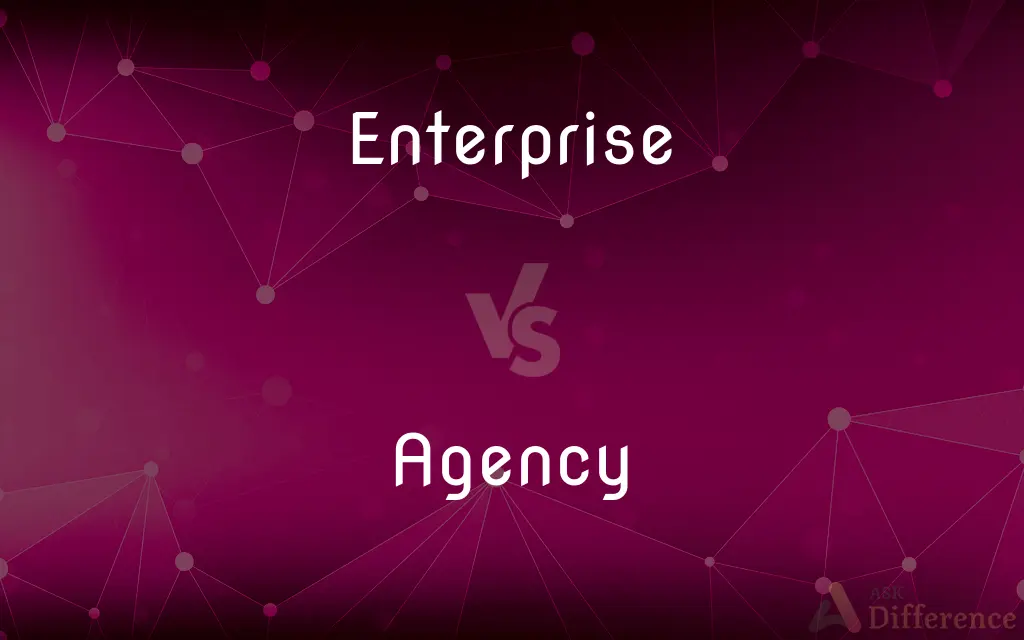Enterprise vs. Agency — What's the Difference?
Edited by Tayyaba Rehman — By Urooj Arif — Updated on April 4, 2024
Enterprise often refers to a company or business venture aimed at profit, while an agency typically denotes a governmental or other organization providing a specific service.

Difference Between Enterprise and Agency
Table of Contents
ADVERTISEMENT
Key Differences
The terms enterprise and agency both play significant roles within economic and organizational contexts but differ fundamentally in their purposes and structures. An enterprise is generally understood as a business or company, primarily aimed at generating profit through offering products or services. It operates within various sectors of the economy, including manufacturing, technology, and services, driven by entrepreneurial spirit and innovation. Enterprises can range from small startups to multinational corporations, emphasizing their scale and scope in the business world.
In contrast, an agency usually refers to a governmental or quasi-governmental organization, or sometimes private entities offering specific services, often regulatory or service-oriented in nature. Agencies are established to fulfill specific statutory goals or provide certain services to the public or specific target groups. They can be part of the executive, legislative, or judicial branches of government and are not primarily driven by profit motives but rather by service provision, regulation, and policy implementation.
While enterprises focus on profitability, innovation, and market expansion, agencies concentrate on regulation, service delivery, and policy execution. This fundamental difference highlights the divergent goals of enterprises and agencies: the former seeks to maximize shareholder value and customer satisfaction through competitive market strategies, while the latter aims to achieve public welfare objectives as defined by statutory mandates.
Another key distinction lies in their operational dynamics. Enterprises operate in competitive markets, adjusting their strategies based on consumer demand, technological advancements, and market trends. Agencies, however, function within a regulatory or service framework defined by legislation and policy directives, often with monopolistic or non-competitive characteristics, since they may provide services that are not profitable or are considered essential public goods.
The source of funding and revenue generation also differentiates enterprises from agencies. Enterprises are funded through investment, sales revenue, and other commercial activities. Agencies are typically funded by government appropriations, grants, or specific fees charged for services, reflecting their non-profit orientation and public service mandate.
ADVERTISEMENT
Comparison Chart
Primary Purpose
Profit generation through business activities
Providing specific services or regulation
Operational Focus
Innovation, market expansion
Regulation, service delivery, policy execution
Nature
Commercial, competitive
Governmental or quasi-governmental, service-oriented
Source of Funding
Investments, sales revenue
Government appropriations, service fees
Examples
Tech startups, multinational corporations
Environmental Protection Agency, CIA
Compare with Definitions
Enterprise
A business venture created for profit.
His latest enterprise focuses on renewable energy solutions.
Agency
A business or organization established to provide a specific service, typically one that involves organizing transactions between two other parties.
The travel agency specializes in luxury vacations.
Enterprise
A company or business, especially when considered in terms of its ability to generate profit.
The family-owned enterprise has been operational for over fifty years.
Agency
An entity established to regulate or oversee specific aspects of the public or private sectors.
The regulatory agency enforces compliance with financial laws.
Enterprise
The initiative and resourcefulness in starting new projects.
Enterprise and innovation are key to the company's success.
Agency
A governmental organization performing a specific function.
The agency is responsible for monitoring environmental standards.
Enterprise
An organization engaged in commercial, industrial, or professional activities.
The enterprise has grown to become a leading name in electronics.
Agency
A division of government with a specific function.
The health agency has issued new guidelines for public safety.
Enterprise
The entrepreneurial activity of launching new businesses.
The city's economic development program supports local enterprise.
Agency
An organization providing a particular service on behalf of another business, person, or group.
She hired a marketing agency to revamp her brand.
Enterprise
A project or undertaking, especially a bold or complex one
A joint enterprise between French and Japanese companies
Agency
The condition of being in action; operation.
Enterprise
A business or company
A state-owned enterprise
Agency
The means or mode of acting; instrumentality.
Enterprise
An undertaking, especially one of some scope, complication, and risk.
Agency
A business with agents that negotiate deals for clients
A talent agency.
A real estate agency.
Enterprise
A business organization.
Agency
An advertising or public relations firm.
Enterprise
Industrious, systematic activity, especially when directed toward profit
Private enterprise is basic to capitalism.
Agency
An administrative division of a government or international body.
Enterprise
Willingness to undertake new ventures; initiative
"Through want of enterprise and faith men are where they are, buying and selling, and spending their lives like serfs" (Henry David Thoreau).
Agency
The capacity, condition, or state of acting or of exerting power.
Enterprise
A company, business, organization, or other purposeful endeavor.
The government sponsored enterprises (GSEs) are a group of financial services corporations which have been created by the United States Congress.
A micro-enterprise is defined as a company or business having 5 or fewer employees and a low seed capital.
Agency
The capacity of individuals to act independently and to make their own free choices.
Moral agency
Individual agency
Enterprise
An undertaking, venture, or project, especially a daring and courageous one.
Biosphere 2 was a scientific enterprise aimed at the exploration of the complex web of interactions within life systems.
Agency
A medium through which power is exerted or an end is achieved.
Enterprise
(uncountable) A willingness to undertake new or risky projects; energy and initiative.
He has shown great enterprise throughout his early career.
Agency
The office or function of an agent; also, the relationship between a principal and that person's agent.
Authority of agency
Enterprise
(uncountable) Active participation in projects. en
Agency
An establishment engaged in doing business for another; also, the place of business or the district of such an agency.
Enterprise
(intransitive) To undertake an enterprise, or something hazardous or difficult.
Agency
A department or other administrative unit of a government; also, the office or headquarters of, or the district administered by such unit of government.
Agency for Toxic Substances and Disease Registry
Central Intelligence Agency
Enterprise
(transitive) To undertake; to begin and attempt to perform; to venture upon.
Agency
The faculty of acting or of exerting power; the state of being in action; action; instrumentality.
The superintendence and agency of Providence in the natural world.
Enterprise
(transitive) To treat with hospitality; to entertain.
Agency
The office of an agent, or factor; the relation between a principal and his agent; business of one intrusted with the concerns of another.
Enterprise
That which is undertaken; something attempted to be performed; a work projected which involves activity, courage, energy, and the like; a bold, arduous, or hazardous attempt; an undertaking; as, a manly enterprise; a warlike enterprise.
Their hands can not perform their enterprise.
Agency
The place of business of am agent.
Enterprise
Willingness or eagerness to engage in labor which requires boldness, promptness, energy, and like qualities; as, a man of great enterprise.
Agency
An administrative unit of government;
The Central Intelligence Agency
The Census Bureau
Office of Management and Budget
Tennessee Valley Authority
Enterprise
To undertake; to begin and attempt to perform; to venture upon.
The business must be enterprised this night.
What would I not renounce or enterprise for you!
Agency
A business that serves other businesses
Enterprise
To treat with hospitality; to entertain.
Him at the threshold met, and well did enterprise.
Agency
The state of being in action or exerting power;
The agency of providence
She has free agency
Enterprise
To undertake an enterprise, or something hazardous or difficult.
Agency
The state of serving as an official and authorized delegate or agent
Enterprise
A purposeful or industrious undertaking (especially one that requires effort or boldness);
He had doubts about the whole enterprise
Agency
How a result is obtained or an end is achieved;
A means of control
An example is the best agency of instruction
The true way to success
Enterprise
An organization created for business ventures;
A growing enterprise must have a bold leader
Enterprise
Readiness to embark on bold new ventures
Common Curiosities
What is an enterprise?
An enterprise is a business or company, typically engaged in commercial, industrial, or professional activities, aimed at generating profit.
What is an agency?
An agency is an organization, often governmental, established to perform a specific function, such as regulation or service provision.
How do enterprises generate revenue?
Enterprises generate revenue through selling products or services, investments, and other commercial activities.
What is the main goal of an agency?
The main goal of an agency is to provide specific services, regulate certain activities, or implement policies as mandated by law.
Can agencies compete in the market?
Agencies typically do not compete in the market in the traditional sense, as their primary function is service provision or regulation, not profit-making.
How do agencies get funded?
Agencies are usually funded through government appropriations, grants, or specific fees for services provided.
What distinguishes an enterprise from a non-profit organization?
Enterprises are primarily profit-driven, whereas non-profit organizations focus on fulfilling their mission without the primary goal of profit generation.
Can an enterprise also be an agency?
Generally, enterprises and agencies are distinct in their goals and operations; however, some enterprises may perform agency-like functions under contract or in public-private partnerships.
What roles do enterprises play in the economy?
Enterprises drive economic growth, innovation, and employment through their commercial activities and competition in the market.
Are all agencies government-owned?
While many agencies are governmental, there are also private agencies offering specific services, usually on behalf of another entity.
Share Your Discovery

Previous Comparison
Gear vs. Sprocket
Next Comparison
Mechanic vs. EngineerAuthor Spotlight
Written by
Urooj ArifUrooj is a skilled content writer at Ask Difference, known for her exceptional ability to simplify complex topics into engaging and informative content. With a passion for research and a flair for clear, concise writing, she consistently delivers articles that resonate with our diverse audience.
Edited by
Tayyaba RehmanTayyaba Rehman is a distinguished writer, currently serving as a primary contributor to askdifference.com. As a researcher in semantics and etymology, Tayyaba's passion for the complexity of languages and their distinctions has found a perfect home on the platform. Tayyaba delves into the intricacies of language, distinguishing between commonly confused words and phrases, thereby providing clarity for readers worldwide.














































